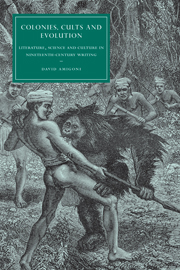Book contents
- Frontmatter
- Contents
- Acknowledgements
- Introduction: literature, science and the hothouse of culture
- 1 ‘Symbolical of more important things’: writing science, religion and colonialism in Coleridge's ‘culture’
- 2 ‘Our origin, what matters it?’: Wordsworth's excursive portmanteau of culture
- 3 Charles Darwin's entanglements with stray colonists: cultivation and the species question
- 4 ‘In one another's being mingle’: biology and the dissemination of ‘culture’ after 1859
- 5 Samuel Butler's symbolic offensives: colonies and mechanical devices in the margins of evolutionary writing
- 6 Edmund Gosse's cultural evolution: sympathetic magic, imitation and contagious literature
- Conclusion: culture's field, culture's vital robe
- Notes
- Bibliography
- Index
- CAMBRIDGE STUDIES IN NINETEENTH-CENTURY LITERATURE AND CULTURE
3 - Charles Darwin's entanglements with stray colonists: cultivation and the species question
Published online by Cambridge University Press: 22 September 2009
- Frontmatter
- Contents
- Acknowledgements
- Introduction: literature, science and the hothouse of culture
- 1 ‘Symbolical of more important things’: writing science, religion and colonialism in Coleridge's ‘culture’
- 2 ‘Our origin, what matters it?’: Wordsworth's excursive portmanteau of culture
- 3 Charles Darwin's entanglements with stray colonists: cultivation and the species question
- 4 ‘In one another's being mingle’: biology and the dissemination of ‘culture’ after 1859
- 5 Samuel Butler's symbolic offensives: colonies and mechanical devices in the margins of evolutionary writing
- 6 Edmund Gosse's cultural evolution: sympathetic magic, imitation and contagious literature
- Conclusion: culture's field, culture's vital robe
- Notes
- Bibliography
- Index
- CAMBRIDGE STUDIES IN NINETEENTH-CENTURY LITERATURE AND CULTURE
Summary
COLONIAL AND HOME AND THE ‘MYSTERY OF MYSTERIES’
Charles Darwin's influential account of his Beagle voyage, the Journal of Researches, was published in 1839; The Origin of Species was not published until 1859. Between these two events, Darwin published a second edition of his Journal in 1845, a year after he had written his private sketch on the solution to the species question (‘the Essay of 1844’), an essay that was produced out of his experience of the voyage, as well as the voluminous reading that Darwin recorded in his private speculative notebooks. Indeed, it was difficult to draw a definitive boundary between private and public forms of inscription among the gentlemen of science who took possession of the species question in the 1830s and 1840s. Sir John Herschel, in a private letter to Roderick Murchison and Charles Lyell, referred to the appearance of new species tantalisingly as ‘the mystery of mysteries’. Such a formulation invited ambitious speculation towards a solution. Herschel's letter was published by Charles Babbage as an appendix to his Ninth Bridgewater: A Fragment (1837). Darwin read the published version of this letter, and marked the occasion in his notebook: ‘Babbage, 2nd Edit. p. 226 – Herschel calls the appearance of new species the mystery of mysteries & has grand passage upon problem! Hurrah – “intermediate causes”.
- Type
- Chapter
- Information
- Colonies, Cults and EvolutionLiterature, Science and Culture in Nineteenth-Century Writing, pp. 84 - 103Publisher: Cambridge University PressPrint publication year: 2007



